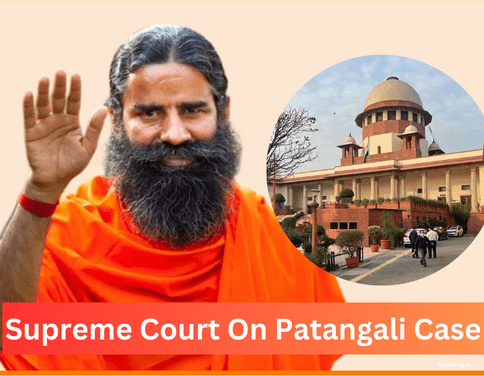In a sharp rebuke, the Supreme Court of India has slammed Uttarakhand authorities for inaction against Patanjali Ayurveda regarding misleading advertisements. A bench of Justices Hima Kohli and Ahsanuddin Amanullah expressed strong dissatisfaction with the sluggish approach of the state licensing authority in addressing the complaints against Patanjali subsidiary Divya Pharmacy dating back to 2018.
Steadfast criticism of the court
The apex court minced no words while reprimanding the Uttarakhand government and its officials for failing to take decisive action against Patanjali Ayurveda. Justices Kohli and Amanullah sharply criticized the slowness of the state licensing authority in handling the case and accused them of deliberately delaying action by “moving the file”.
Supreme Court Rejection of apology
Demonstrating unwavering resolve and steadfast commitment to maintaining the integrity of the judicial process, the Supreme Court decisively rejected the apology sought by yoga guru Ramdev and Acharya Balkrishna, managing director of Patanjali Ayurveda. The court carefully examined the sincerity of his apology, which cast doubt on the genuineness of his expression of remorse. Considering these apologies as an insincere attempt to minimize his culpability, the bench underlined the seriousness of the situation and the imperative of accountability.
Refusing to condone his actions, the bench emphasized the deliberate and deliberate nature of the violation of court orders and undertakings. This clear stance serves as a powerful reminder that adherence to the rule of law is non-negotiable and that individuals and entities, regardless of their stature, must be held accountable for their actions. Through its unwavering commitment to justice and accountability, the Supreme Court strengthens the principles of impartiality, transparency and rule of law, protects the integrity of the judicial system and upholds public confidence in the administration of justice.
सुप्रीम कोर्ट को बाबा की माफी कबूल नहीं की।#BabaRamdev #Patanjali#MatchFixingNahiChalegi#Chandigarh pic.twitter.com/CBQMhXboGI
— Sandeep Khasa (@SamKhasa_) April 10, 2024
Lack of action and accountability
The Supreme Court expressed deep surprise at the apparent collusion between the Uttarakhand Licensing Authority and Patanjali Ayurveda, a worrying revelation that underlines the blatant disregard for regulatory responsibilities. Justice Hima Kohli’s scathing remarks, describing the licensing authority’s actions as “hands-on” with Patanjali, further heightens the seriousness of the situation, highlighting the depth of the regulatory failure.
This collusion not only undermines the integrity of the regulatory process but also undermines public confidence in the efficacy of the oversight mechanism. Despite Dr. Mithilesh Kumar’s serious appeal for leniency, the court maintained its steadfast stance strongly criticizing the lack of accountability within the regulatory framework.
This firmness sends a clear message that regulatory bodies must maintain the highest standards of integrity and independence, free from any undue influence or bias. Failure to do so not only compromises the implementation of the rules but also undermines the basic principles of justice and fairness. Therefore, the Supreme Court’s clear condemnation of collusion is a reminder of the imperative of transparency, accountability and fairness in regulatory governance.
Call for accountability
The Supreme Court’s stern warning serves as a clarion call for accountability within regulatory bodies. By holding the authorities to task and refusing to condone willful disobedience, the court sets a precedent for upholding the rule of law and protecting consumer interests.
Finally, the Supreme Court’s clear stance against regulatory inertia and corporate misconduct sends a clear message: accountability and adherence to the rule of law are non-negotiable. Maintaining the integrity of the judicial process is paramount to protecting the public trust and ensuring equitable access to justice.
Follow Us On Instagram Follow Us On XAlso Read: Unveiling Dhruv Rathee’s Net Worth: Insights and Analysis

